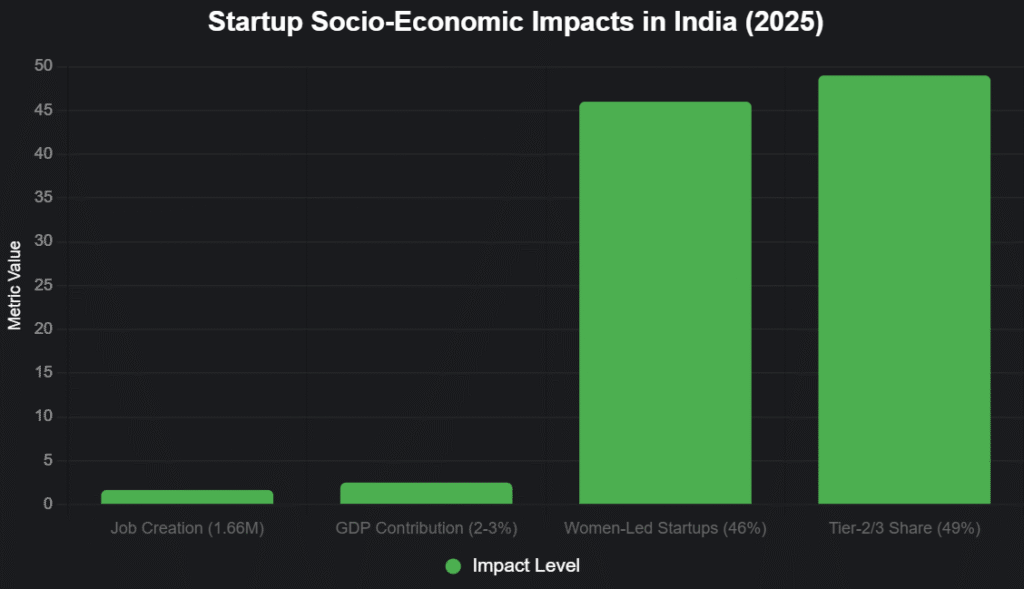In India’s startup odyssey, where 195,065 DPIIT-recognized ventures power a $450 billion digital economy, these aren’t mere businesses—they’re nation-builders, forging socio-economic metamorphosis through innovation, inclusion, and impact. From generating 1.66 million direct jobs and 2-3% GDP contribution to empowering 73,000 women-led startups and revitalizing Tier-2/3 cities, startups are the engines of Viksit Bharat, as per Startup India’s ninth anniversary report. With unicorns valued at $350 billion and e-commerce hitting $188 billion by 2025, their ripple effects—job creation in IT (2.04 lakh roles), skill upgradation for 1.42 crore youth via PMKVY, and urban revitalization like Infosys’ Bangalore boom
—underscore a profound shift from job-seekers to creators. Yet, measuring this transformation demands metrics beyond funding: social ROI, regional equity, and sustainability indices. As X users proclaim, “Startups: Turning youth from job seekers to job creators,” this article dissects their socio-economic alchemy, backed by NITI Aayog, IBEF, and real-time insights. Dismiss startups as profit chasers, and you’ll undervalue their role in India’s $5 trillion ascent.
Table of Contents
The Socio-Economic Alchemy: Startups as Transformation Catalysts
Startups transcend commerce, acting as vehicles for inclusive growth: 49% hail from Tier-2/3 cities, slashing urban migration 20% and fostering local ecosystems, per IBEF. Their GDP punch—2-3% via digital sectors—fuels 5% overall growth, with e-commerce alone eyeing $188 billion by 2025. Socially, 73,000 women-led startups (46% of total) empower marginalized voices, while 1.66 million jobs—40% in tech—absorb youth, reducing 6.5% unemployment. X echoes: “Startups are engines of nation-building, solving India’s challenges.” Measuring this? Beyond valuation, track social ROI (jobs/GDP add), inclusion indices (women/Tier-2 share), and sustainability (ESG compliance).
This bar chart visualizes startup contributions to socio-economic pillars in 2025:

Source: DPIIT, IBEF. Jobs lead, transforming livelihoods.
Key Metrics: Quantifying the Nation-Building Power
Startups’ socio-economic footprint demands holistic measurement—GDP add, employment multipliers, and equity indices.
| Metric | Description | 2025 Value | Impact |
|---|---|---|---|
| Direct Jobs Created | Roles in startups across sectors | 1.66M | 40% tech; absorbs 1.42Cr youth via PMKVY |
| GDP Contribution | Economic value from startup activity | 2-3% | $10-15B; e-commerce $188B by 2025 |
| Women Empowerment | Women-led or directed startups | 73K (46%) | Boosts inclusion; 18% overall startups |
| Regional Equity | Tier-2/3 city startups | 49% | Reduces migration 20%; local revitalization |
| Social ROI | Jobs/GDP add per startup | 8-10x | Multiplier effect; urban renewal like Bangalore |
| Innovation Index | Patents/unicorns from startups | 120+ unicorns ($350B) | Global rank 3rd; 82K patents FY23 |
Source: Startup India, NITI Aayog. Metrics show 557x startup growth since 2014.
1. Job Creation: From Seekers to Creators
Startups generated 1.66 million direct jobs by late 2024, with IT at 2.04 lakh—turning youth into creators, as X notes: “Startups: Job seekers → job creators.” Multiplier: 2-3 indirect roles per job, per CII.
2. GDP and Economic Revitalization
Contributing 2-3% GDP ($10-15B), startups drive 5% overall growth via digital sectors, revitalizing cities like Bangalore via Infosys-like impacts. E-commerce: $188B by 2025.
3. Inclusion and Equity
73,000 women-led startups (46%) empower marginalized groups, while 49% Tier-2/3 ventures reduce inequality, per DPIIT.
Case Studies: Startups as Socio-Economic Architects
- Zomato: 3 lakh gig jobs, $25B valuation; urban food access, women empowerment via 30% female partners.
- Groww: 40M users democratize investing; 1M jobs in fintech, boosting middle-class wealth.
- DeHaat: 1.5M farmers’ incomes up 50%; rural transformation via agritech.
X: “Startups: Not companies, engines of nation-building.”
Challenges: Measuring the Intangible
80% failures mask socio-economic gains; metrics like social ROI lag, with rural penetration at 20%. Solutions: DPIIT’s impact dashboards.
The Transformation Horizon: $1 Trillion Legacy
By 2030, startups could add $1T GDP, 50M jobs. Founders: Innovate inclusively. Policymakers: Track holistic metrics. Startups aren’t building companies—they’re building nations. Measure the metamorphosis, or miss the miracle.
social media : Facebook | Linkedin |